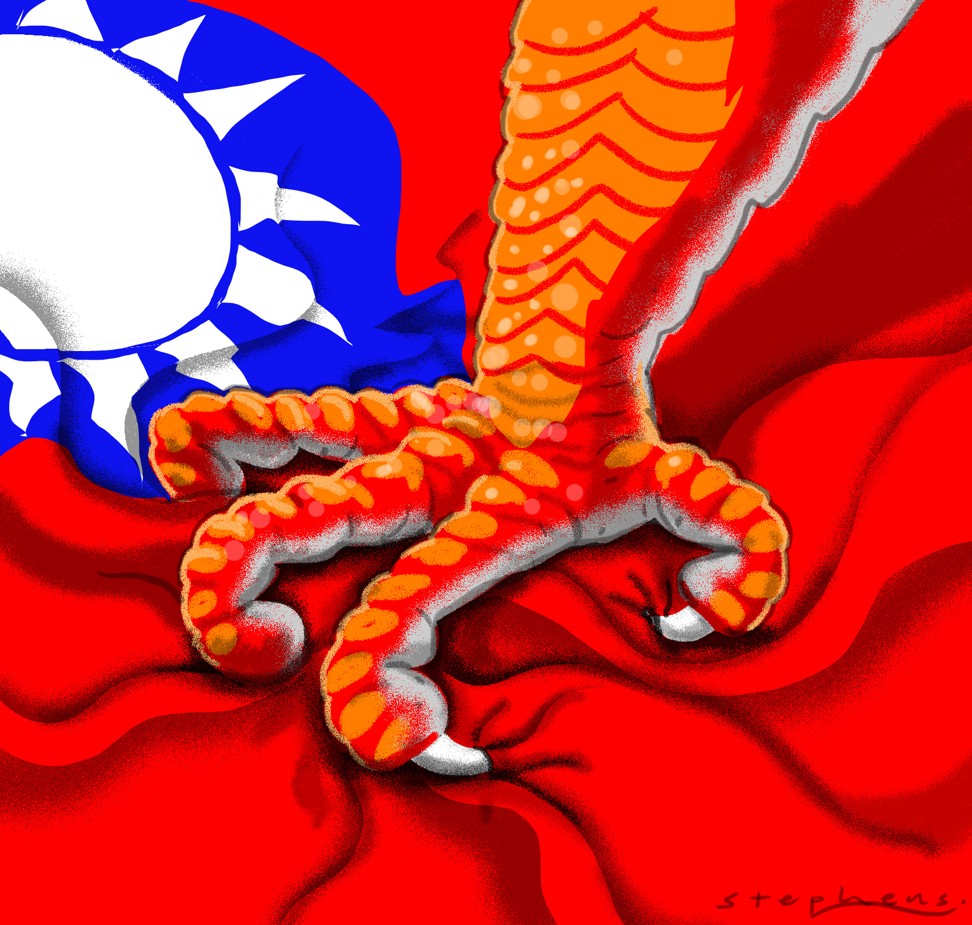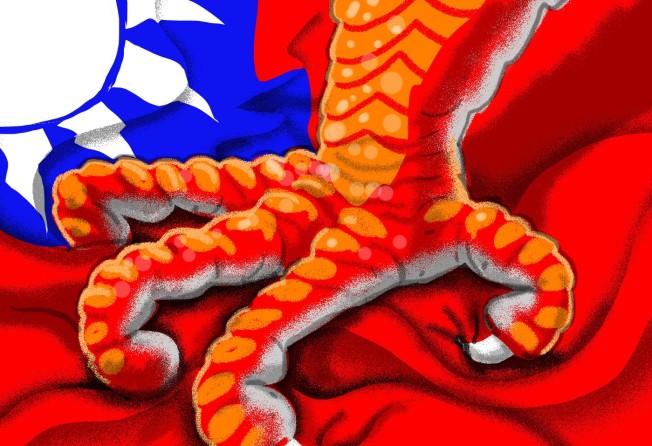
Is China planning to take Taiwan by force in 2020?
Deng Yuwen believes Beijing is coming to the conclusion that if it is to achieve reunification with Taiwan, as Xi Jinping has pledged to do at the 19th party congress, it has to do so by force, and sooner rather than later


President Xi Jinping’s report at the 19th Communist Party congress offers some clues. In the address, he identified “one country, two systems” and the reunification of the motherland as a fundamental strategy of a “new era” for China. This provides a clue to Beijing’s timeline for resolving the Taiwan problem.
According to the report, the new era refers to a period from now until the middle of this century. By 2050, China is to achieve the “great rejuvenation of the Chinese nation” and become a modern socialist power.
A list of 14 items describe this new era, and one of them involves reunification with Taiwan. This means Beijing must take control of Taiwan by 2050 at the latest.
Plainly, as long as Taiwan remains outside the Chinese fold, the “great rejuvenation” of the Chinese nation cannot happen.
No surprise, then, to hear Xi say that Beijing would never allow “any individual, any organisation, any political party, at any time or by any means, to split any single piece of the Chinese territory”.
Last month, a Chinese diplomat’s fighting words over the idea of the US sending navy ships to Taiwan were also revealing. Li Kexin, a minister at the Chinese embassy in Washington, warned that port-of-call exchanges between the US and Taiwan would not be tolerated.
“The day a US Navy vessel arrives in Kaohsiung is the day that our People’s Liberation Army unifies Taiwan with military force,” he told mainland media.
While it is unlikely the PLA would really start a war over a US Navy visit to Taiwan, the words reflect a consistent belief of Chinese leaders: that Taiwan has to be taken back by force.
Since Xi came to power, the party has been open about its wish for the PLA to be battle-ready. No doubt the army’s first target would be Taiwan.
Also, Xi’s sense of calling would never allow him to tolerate Taiwan’s indefinite separation from the mainland. Whatever one may think of Xi, most people would agree that he is driven by a strong sense of national pride.
That is why, as soon as he came to power, he launched the “Chinese dream” campaign and set out the goal of achieving national rejuvenation. In the party congress address, he painted a picture of the new era that reflected his thinking and linguistic style.
As a leader who is bent on raising China’s global stature to a level that rivals the nation’s glory years in Han and Tang times, Xi would surely not tolerate an indefinite split between Taiwan and the mainland.
Nonetheless, the points raised so far only signal that Beijing has a timetable in mind to unify Taiwan with China, but they do not explain why the PLA could move to take Taiwan by force in 2020.
A combination of factors could point to a military confrontation.
They include Trump’s labelling of China as a strategic rival in his administration’s national security strategy; Beijing’s worry about the pro-independence movement in Taiwan and its belief that it now has the ability to resolve the Taiwan problem once and for all; a misjudgment by Taiwanese President Tsai Ing-wen; and Xi’s sense of his own legacy.
Watch: How Hong Kong and Taiwan people feel about relations with China
First of all, why would Beijing opt for unification by force, rather than through the peaceful negotiation it has always championed? There are four reasons. First, after extending economic help to the island for years, Beijing has still failed to win the hearts and minds of its people. Instead, cross-strait relations have deteriorated.
Second, as one generation of Taiwanese replaces another, the “Chinese” identity among the people will only grow weaker.
Third, the influence of Taiwan’s political parties is waning. Even if the Kuomintang wins back power, it would not be in a position to lead cross-strait unification.
Fourth, more and more Chinese are calling for unification by force.
Thus, though on the surface Beijing has continued to call for a peaceful reunification, it has in fact ditched the idea.
Though on the surface Beijing has continued to call for a peaceful reunification, it has in fact ditched the idea
As Beijing believes it has to use force to reunite with Taiwan, the next step would be to find a good time to do so. The year 2020 offers such an opportunity.
That’s the year when China would be approaching the first of its “two centenary” goals – the establishment of a xiaokang, or moderately prosperous, society by 2021, the 100th year of the founding of the Communist Party.
This would act as a driving force for China to take back Taiwan by force. If China becomes a well-off nation with Taiwan in its fold, it would mean a historic achievement for Xi.
Next, Trump’s national security strategy not only labels China and Russia as America’s “strategic rivals”, it also pledges to maintain strong ties with Taiwan. This will quicken Beijing’s plans to take back Taiwan by force.
In reality, China and the US are, of course, strategic rivals. But by stating it in its security strategy, the US indicates a shift in its long-term policy on China, letting it be known that it would seek to contain China rather than work with it. This would lead Beijing to conclude that it should resolve the Taiwan problem sooner rather than later.
Is the PLA ready for such a battle? In a recent interview, China analyst Ian Easton said he believed the Chinese military would not be ready for an attack in 2020 because of the slow pace of military reform. However, many Chinese analysts would not agree with that view.
At the 19th party congress last October, Xi pledged a major upgrade in mechanisation and the communications systems in the armed forces by 2020, which would greatly enhance the country’s strategic capabilities.
By 2035, he said, China would have completely modernised its defence forces; by the middle of the century, it would become a world-class military force.
The military has come a long way since reforms were launched four years ago. And fighting a war would be the best way to gauge its improvements.
In today’s China, more and more people are advocating the use of force to unify Taiwan with the mainland.
A series of military drills focused on Taiwan in recent days has also raised speculation that the mainland is preparing itself for a military invasion. It is likely that such “encirclement patrols” might become routine.
All is set for Beijing to unify with Taiwan by force, except for one thing – a pretext or a reason to take action. Emboldened by US support, the Taiwanese government that Tsai leads may well test China’s bottom line by further cementing its ties with America, such as with the proposed exchanges between US and Taiwanese navies.
Finally, whether Beijing decides to mobilise against Taiwan in 2020 will still depend on the decision of its leaders.
Xi may be tempted to secure the historic achievement of reunification as part of his legacy. Furthermore, if war breaks out, the peacetime systems and procedures will have to be set aside.
This will allow Xi to stay in power beyond his expected retirement in 2022, to give him more time to work on realising the Chinese dream of rejuvenation.
If Beijing takes up arms against Taiwan in 2020, there will be formidable changes for East Asia and the world. North Korea may also risk waging war on South Korea, if its nuclear capabilities are not eradicated earlier.
I do not want to see war breaking out. For this reason, we must pay more attention to what happens in 2020.
Deng Yuwen is a researcher at the Charhar Institute think tank. This article is translated from Chinese